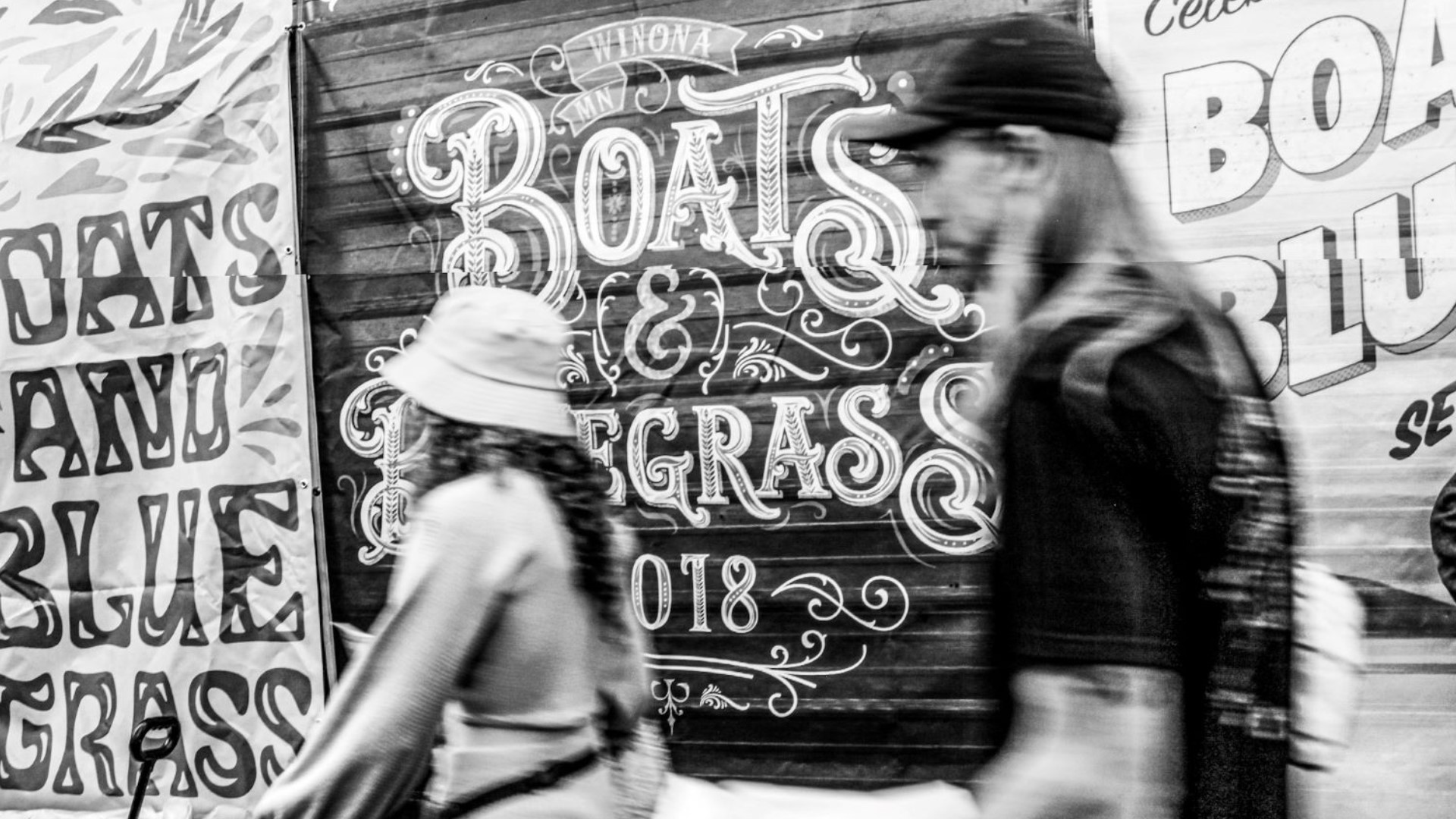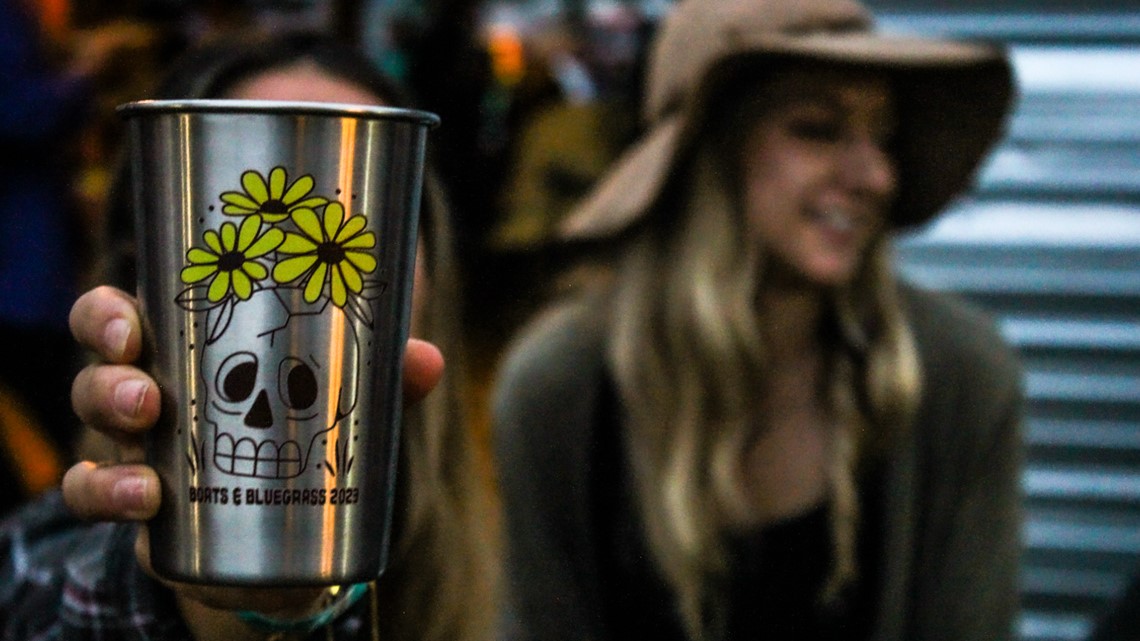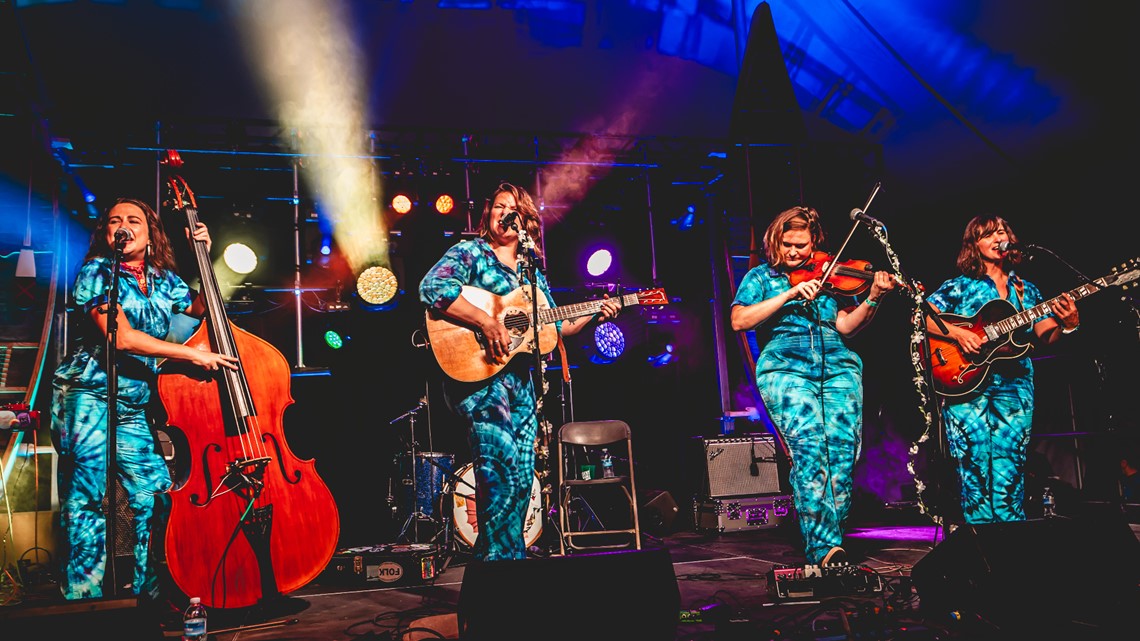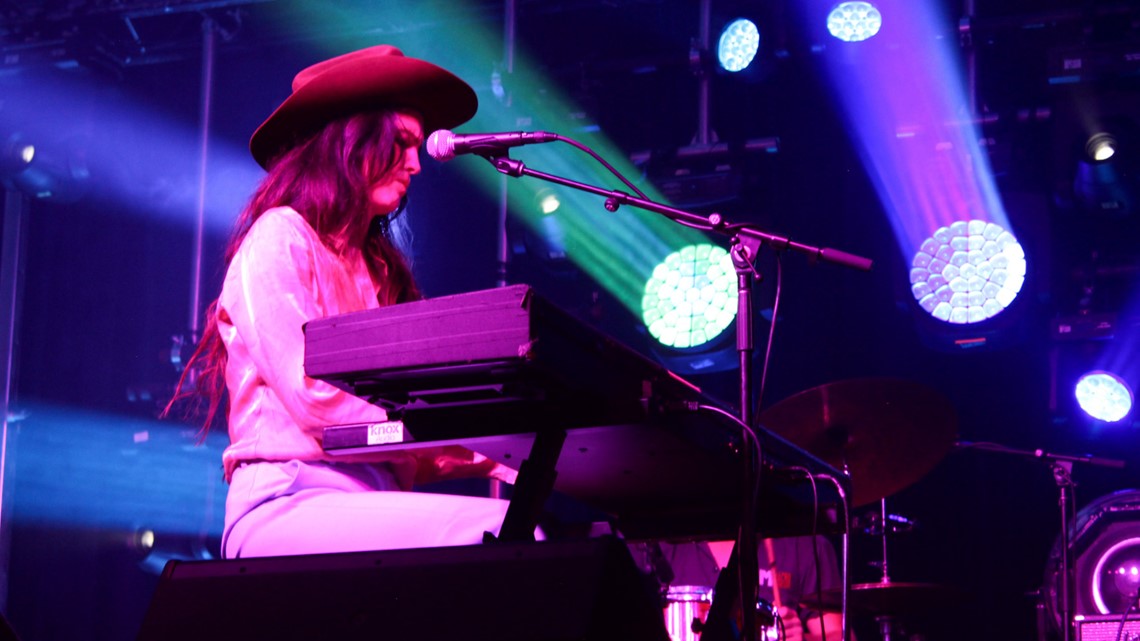'A sisterhood': Women wade the waters at Boats and Bluegrass
Festival organizers Rebecca and Isaac Sammis say they're on an open-ended mission to make its appeal even bigger, better and broader as it enters its 20th year.
Samantha Fischer/KARE 11

On 80 acres of woodland, tucked in along the shores of the sacred Mississippi River, thousands of people gather each year to find peace, show gratitude and honor the storytelling traditions already woven into the ancient soil.
By most accounts of fans and artists who visit the grounds of Winona's Boats and Bluegrass music and arts festival each year, connecting with fellow festival-goers each fall, is simply, spiritual.
"The whole scene is just absolutely magical, what they've created there, it is extremely inclusive," said Laura Farley, bassist and singer for the bluegrass group High & Rising. "It's so peaceful, and there's just an intense amount of love around everybody that's there. There's so much joy and happiness; it's just really, completely the best weekend of the year in terms of the vibe and the people that show up and the music that happens."
While some of what's drawn Midwesterners to Boats for the last 19 seasons has certainly stayed the same, the festival's organizers, Rebecca and Isaac Sammis, say they're on an open-ended mission to make its appeal even bigger, better and broader as it enters its second decade. For the Sammis, that means making a solid effort to not only supply foot-stomping fun in the forest, but also to boost diversity and inclusivity — across musicians, visual artists, vendors and those working behind the scenes — spanning genres and spaces historically dominated by men.
"It feels like there's a space for everyone at the festival," Rebecca said.


'It's time to pay attention'
Laura Farley always saw herself playing bass, but she didn't always see herself playing bass in front of a crowd. As a single mom in her 20s, job performance in a literal sense just didn't quite seem plausible.
"After college, I was actually a financial advisor and had a pretty solid career path down that route, and music was definitely not really something I was pursuing," she said. "At that time, I was just putting food on the table and raising some babies.
"It's a hard business, and I think like most industries, it's harder for women than men, and if you throw any children or family like type of stress and jobs on top of, it's really hard to survive as solely a musician. You get good at juggling, but I think as a as a woman, we've got some superpowers that just kind of kick in when you need them to in life — and we've all got 'em," Farley said.
However Farley, the only woman-identifying member of High & Rising, said that antiquated model seems to be changing.
"I feel like the female representation [in the industry] has been blooming right before our eyes. I know as the only female in my band, I'm making a lot of decisions — what shows we're going to do or how much we're valued and are going to get paid for that show. It gives a lot more power to women," she said. "The ability of women to do it [make a career of music] now is bigger than it ever has been."
It's a sentiment shared by members of Minneapolis-based folk band The Foxgloves.
As the first and only all-female group at another local folk fest in recent years, members of the six-piece say there's been a palpable shift toward more equal representation as we round out the final festival months of 2023.
"It's time to pay attention," said Maura Dunst, fiddle and mandolin player, and singer for the group. "You know — just like in other areas of society where there's a significantly dominant culture that can make a difference from within. The same thing is happening in music."
The progression toward equal gender representation is only made possible with help from both inside and outside the industry's female fellowship.
"We definitely have male friends/colleagues in the local scene who are very aware of this and will make the effort that needs to be made, open the door for us, break the code for us, etc.," Dunst said. "We don't just try to network with other women musicians, although we certainly do, but we also network with a lot of standard kind of five-piece, all-male bluegrass bands. It's all beneficial. We want to play with Pert Near [Sandstone] just as much as we want to play with Big Richard, you know?"


prowess
But where there's progress, there's often also pain.
Celia Woodsmith, founding member, lead singer and guitarist for Grammy-nominated string band Della Mae, for lack of a better phrase, has seen some s***.
"I would not be surprised if younger women in this scene are getting the very same pressure that we used to get," she said. "We used to get people to telling us ways they thought we could lose weight; we used to get really uncomfortable photography requests — and we actually went through with some of the stuff. You really just want people to listen to your music, but there's so much more that goes along with that if you're a woman."
Woodsmith said she agrees the scene is a lot different now than when she entered it over a decade ago — but frankly, so is she.
"We're older — personally, if I may say this: We don't take as much s***," Woodsmith said. "We know who we are, we know what we want. We're not as liable to kind of be guided by the misogyny of the scene as we used to be. We're fully confident in who we are and what we bring to the table, which is top female talent in songwriting, singing and instrumental — you know, prowess."
And while some of the members of Della Mae have cycled through and come and gone, Woodsmith said that Della Mae, at its core, has maintained its overarching objective: to be "a band of women — together."
"I think it's worked out in a way, rather than being a weakness. Having a lot of different women coming in and out of the band, we've been able to show off a lot of different female talent," she said. "I mean, we're still here, we're still going, we're still playing a lot of the same songs. We're still Della Mae — we stand for the same stuff."


sisterhood
But in order to stand, the women of bluegrass know they can't just sit around and wait.
"It takes effort, you know? And we're willing to put in the effort," Dunst said.
Their efforts, manifesting in many ways from writing and performing to supporting and advocating.
"[We're] really trying to put our money where our mouth is with who we play with, who we have on stage with us, who we perform with, the types of songs that we sing — you know, we're not going to be singing murder ballads. We're just not," Woodsmith said. "It's a huge part of bluegrass music, but you can bet that we're not going to be up there singing about the killing of a woman."
Additionally, Celia said Della Mae consciously tries to include all kinds of different folks up on stage.
"Who's at that festival? Can we ask them to sit in with us? Can we promote them? Can we have more fun while we're on stage because there's a new person on stage and it makes us play the song differently? I think no matter what band you're in, collaborating with other people makes a big difference in lifting people up. We all get stronger when we support one another."
Lifting each other up — also a top priority for The Foxgloves.
"We definitely make an effort to promote gender equity on lineups, both in terms of lineups that we book, and ourselves and in terms of lineups that we get added to — or that we don't get added to," Dunst said.
But in the end, it's the female bonds that truly bind them.
"It's kind of a sisterhood," said Nikki Lemire, harpist and vocalist for the Foxgloves. "We've really stuck together and known each other through a lot of different hardships that we've had in our lives, like life changes that kind of come up with being a mother, or changing jobs, or navigating health crises — the kinds of things that you would really want to be able to lean on your friends for. I think that's the fabric of this band."
She added, "I have three girls to kind of show, like, 'Hey, you know you can do this.'"
The women teaching the next generation of storytellers: Your narrative matters, too.
"If you dig deeper, there's so many more stories to be told," Rebecca said.


WATCH MORE ON KARE 11+
Download the free KARE 11+ app for Roku, Fire TV, Apple TV and other smart TV platforms to watch more from KARE 11 anytime! The KARE 11+ app includes live streams of all of KARE 11's newscasts. You'll also find on-demand replays of newscasts; the latest from KARE 11 Investigates, Breaking the News and the Land of 10,000 Stories; exclusive programs like Verify and HeartThreads; and Minnesota sports talk from our partners at Locked On Minnesota.
- Add KARE 11+ on Roku here or by searching for KARE 11 in the Roku Channel Store.
- Add KARE 11+ on Fire TV here or by searching for KARE 11 in the Amazon App Store.
- Learn more about the KARE 11+ app for Apple TV in the Apple App Store.
- Learn more about KARE 11+ here.
Watch more local news:
Watch the latest local news from the Twin Cities and across Minnesota in our YouTube playlist:
